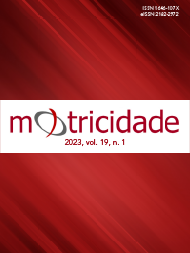What do the parents perceive, and how it affects children’s motor competence? An exploratory study in 5 to 11 years old south Brazilian children
DOI:
https://doi.org/10.6063/motricidade.27232Keywords:
Child, Locomotor skills, Manipulative skills, Motor skills, perceptionsAbstract
The present study examines sex differences regarding children's self-perceptions and motor competence (locomotor and object control subtests), parents' perceptions about their boys’ and girls’ competence, and the associations among these variables. Parents and their children (N = 77; M = 8.70, SD = 2.13) participated in the study. The children’s motor competence was assessed using the Test of Gross Motor Development – Second Edition (TGMD-2). The children’s self-perceptions were assessed using the Pictorial Scale of Perceived Competence and Social Acceptance and the Self-Perception Profile for Children, depending on the child’s age. The parental perception of their children's motor competence was assessed using an adapted version of the children’s perceptions of motor competence. Boys and girls were similar regarding the locomotor subtest; boys showed significantly higher scores for the object control subtest than girls. Parents’ perceptions of children’s motor competence were significantly related to the children´s motor competence and were the stronger predictor in the locomotor model and the second predictor in the object control subtest model; sex was the stronger predictor for the object control subtest. Our findings address new information regarding children's motor and parents' motor competence.
Downloads
Published
Issue
Section
License
The authors of submitted manuscripts must transfer the full copyright to Journal Motricidade / Sílabas Didáticas Editions. Granting copyright permission allows the publication and dissemination of the article in printed or electronic formats, and copyrights start at the moment the manuscript is accepted for publication. It also allows Journal Motricidade to use and commercialise the article in terms of licensing, lending or selling its content to indexation/abstracts databases and other entities.
According to the terms of the Creative Commons licence, authors may reproduce a reasonable number of copies for personal or professional purposes, but without any economic gain. SHERPA/RoMEO allows authors to post a final digital copy (post-printing version) of the article on their websites or on their institutions' scientific repository.


